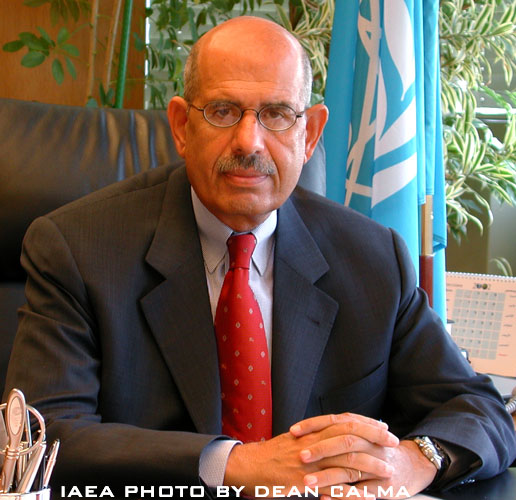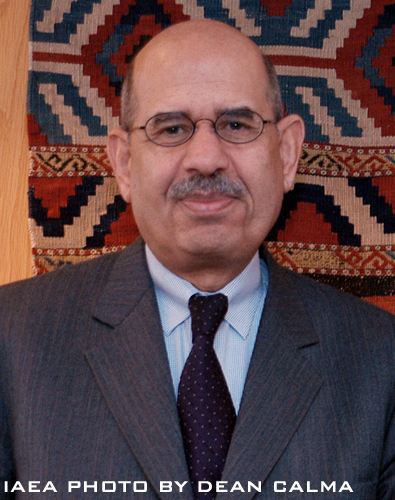Official Stats
- Official Title: Opposition figure
- Government: Transitional
- Years Left in Office: N/A
- Political Classification: Center-left
- Education: BS in Law, DEA & PhD in International Law
- Age: 81 (born June 17, 1942)
Mohamed ElBaradei Facts and Information
Important Points
- Mohamed ElBaradei is an Egyptian who was head of the IAEA for years, and has tremendous amounts of international respect...but not from the US!
- Mohamed ElBaradei never liked the one-party state of Hosni Mubarak and was a vocal antagonist of the administration.
- Mohamed ElBaradei spent most of his life and career in Europe, which is why he perhaps does not have a lot of support in Egypt, as many see him as an outsider.
- ElBaradei tried to run for President against Mubarak, and has apparitions of being a political leader in the new Egypt as it evolves.
The Rundown
Having Mohamed ElBaradei atop a million-person revolution is not unlike having the head of your school’s debate club quarterbacking the varsity football team in the state championships. Sure, ElBaradei’s been a prominent Egyptian figure on the international scene for years and won the Nobel Peace Prize in 2005 for his leadership of the International Atomic Energy Agency (IAEA). But the bald, gray and technocratic ElBaradei, 68, seems better suited for a subdued discussion of inspection regimes in Vienna than a fiery revolutionary demonstration on the streets of Cairo. BUT! He is an ardent Egyptian nationalist who has denounced the Mubarak regime for decades, and will likely be a significant figure in the revolution/evolution of Egypt in the coming decade….so who is he?
ElBaradei, whom several opposition groups and demonstrators tapped as their representative in negotiations with the Mubarak regime during the revolutionary angst, defies expectations. He is rational and outspoken, secular and was consistently opposed to Egyptian strongman Hosni Mubarak’s repression of religious political parties for Hosni’s three-decade long rule. A product of the Egyptian diplomatic corps and a veteran IAEA bureaucrat who has lived much of his adult life in Europe, ElBaradei’s ascension as the opposition’s consensus figure was not widely embarced by the masses though, many of whom see him as on outsider…and his durability in the role of true political leadership in the future is also questionable. He returned to Egypt just last year in hopes of making a run against Mubarak in this September’s presidential election, only to leave again after a series of disputes with its fractured and weak political parties.
It would have been impossible to imagine ElBaradei in the role a decade ago. After years of service at the IAEA, he was tapped to run the organization in 1997. He was serious and expert in issues of proliferation and believed strongly in the compact between nuclear and nonnuclear states that lay at the heart of the weakened nonproliferation treaty. He was blunt about trying to prevent Iran and North Korea from getting nuclear weapons, but he was equally blunt about holding the nuclear powers to their commitment under the treaty to work toward giving up their nuclear weapons.
ElBaradei told a reporter from Der Spiegel magazine in an interview, of which a translation from German is published on the IAEA website, “I am afraid that the memory of Hiroshima is beginning to fade. I am afraid that nuclear weapons will fall into the hands of dictators or terrorists. And, I am also afraid of the nuclear arsenals of democratic countries, for as long as these weapons exist there can be no security against the catastrophic consequences of theft, sabotage or accident.”
What propelled ElBaradei to international fame was his resistance to the Bush Administration’s rationale for war in Iraq in 2002 and 2003. The IAEA had been charged with nuclear inspections in Iraq and had found no trace of weapons of mass destruction, despite increasingly intrusive raids. The Bush team, worried that ElBaradei was undermining their case for war, began a whisper campaign against him and a public campaign against the IAEA, calling them both ineffective and incapable of overcoming Saddam Hussein’s deception.
As the debate raged, ElBaradei stood up to the U.S. at the U.N. First, in late 2002, he said that aluminum tubes purchased by Iraq were for missiles, not uranium-refining centrifuges, as George W. Bush had asserted in a speech to the body earlier in the year. Then he announced on March 7, 2003, days before the war began, that documents provided by the U.S. to the IAEA alleging Saddam attempted to purchase uranium from Niger were, in fact, fake. ElBaradei later turned out to be correct on both counts, a vindication that contributed to his organization’s choice for the Nobel Peace Prize in 2005. And also why the US hates him.
But standing up to the U.S. as the head of a multinational organization is not the same as channeling the rage of a country into stable political reform. ElBaradei is from a comfortable upper-middle-class family (his father was a lawyer), and he has no natural base of support. He was welcomed as a hero by a few thousand supporters when he returned to Egypt last year, thanks to his stature as a figure of national pride and his stated intention of taking on Mubarak. But the reformist party he founded quickly fractured, and he had no organization to return to when he went back in January.
But ElBaradei has played his hand well since returning. He has been vociferous in his criticism of the U.S., a popular thing to do in Egypt. Calling the Obama Administration’s refusal to denounce Mubarak “a farce,” ElBaradei told CBS news that the U.S. has to “stop the life support to the dictator and root with the people. I mean, you are losing credibility here.” He also benefited from the thuggish house arrest Mubarak imposed on him briefly just after his return to Egypt.
Since Mubarak’s demise, ElBaradei has not really been at the forefront of holding together the broad coalition of Islamic and secular political forces that will be shaping Egypt’s future. ElBaradei could end up serving in an interim capacity as a technocratic leader. Or he could run for President, as he previously said he intended to, in order to implement his goals of political and constitutional reform.
The effect of ElBaradei’s leadership on U.S.-Egypt relations would not necessarily be bad. For years the U.S. and Egypt have been locked in an unhealthy relationship. The U.S. looked the other way on Mubarak’s dictatorship because of the help he gave on counterterrorism and Israeli affairs; in return, Mubarak got $1.5 billion in aid every year. But the relationship had reached its limit: Mubarak couldn’t deliver progress on peace, and the U.S. couldn’t give more than it already had. Both sides became dissatisfied. “We have a mutually resentful relationship,” says Jon Alterman of the Center for Strategic and International Studies in Washington. “It needs to be rethought and repurposed.” And that is a job for which ElBaradei is definitely well suited.
So Look for the educated, secular, thoughtful, nationalistic, scholarly and gentlemanly Mohamed El-B to play a role in the unfolding drama that is Egypt’s evolution, be it a small role, a behind the scenes role, or possibly a Presidential role! Who knows what the future will bring, but its good to know Mo El-B either way!
Photos
Plaidcasts Involving this Leader
- Arab Anger: Why Here, Why Now? Jan 31, 2011
Video Interviews
Translate This Page


